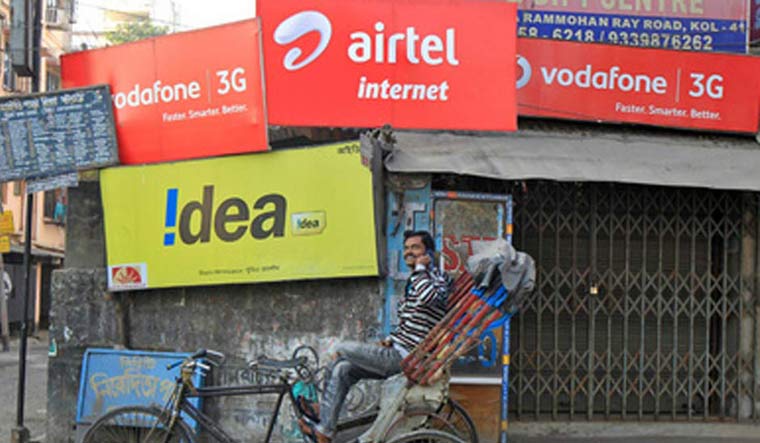Bharti Airtel, Vodafone-Idea and other telecom operators may have to pay the government a whopping Rs 1.4 lakh crore following a Supreme Court order that sent shock waves through an industry already grappling with billions of dollars in debt and an intense tariff war to retain customers.
The top court upheld the government's position on including revenue from non-telecommunications businesses in calculating the annual adjusted gross revenue (AGR) of telecom companies, a share of which is paid as licence and spectrum fees to the exchequer.
While the government had raised a demand of Rs 92,000 crore from Bharti Airtel, Vodafone, Idea and many now-defunct telecom operators in licence fees based on revised revenue, the actual payout will be around Rs 1.4 lakh crore after including spectrum usage charge, penalty and interest, official sources said.
Over the next few days, the numbers will get further calibrated, the sources added.
Older telecom companies would be the worst hit, while richest Indian Mukesh Ambani's Reliance Jio, which entered in 2016, owes the least among all.
Shares of Vodafone-Idea plunged 23 per cent to a record low after the Supreme Court verdict, while Airtel tumbled as much as 9.7 per cent before reversing the losses. Reliance Industries, the parent of Jio, rallied 3.2 per cent.
"Fresh calculation will be done now for all the liabilities of telecom operators. The total amount is around Rs 1.34 lakh crore. It is likely to go up by 4-5 per cent as the liability of one more quarter will get added to it," an official source told PTI.
Bharti Airtel faces the highest liability of around Rs 42,000 crore after including licence fees and spectrum usage charges, while Vodafone-Idea may have to pay about Rs 40,000 crore. Jio may have to pay just Rs 14 crore or so.
Not much of the remaining amount may be realised as other operators such as Aircel and Reliance Communications are under insolvency proceedings.
"We are disappointed with the verdict," Airtel said in a statement. "This decision has come at a time when the sector is facing severe financial stress and may further weaken the viability of the sector as a whole. The government must review the impact of this decision and find suitable ways to mitigate the financial burden on the already stressed industry."
Vodafone Idea Ltd (VIL) warned of "damaging implications" for the industry and indicated it could explore filing a review application after legal consultation.
The judgment has "significantly damaging implications for India's telecom industry" that is already reeling under huge financial stress and is left with only four operators, it said.
"Today's order has a huge impact on two private operators while most of the other impacted operators have exited the sector. We urgently request that the government engage on this matter in order to find ways to mitigate the financial stress for the industry," it added.
The Cellular Operators' Association of India (COAI) said in a statement that it remains to be seen whether the industry -- which is reeling under a daunting debt of about Rs 4 lakh crore and is in dire financial straits -- will be able to recover from this setback.
The dispute over revenue share dates back to 1999 when the telecom policy mandated licence and spectrum fees to be paid by operators as a share of their revenue. While telecom companies maintain that only core income accrued from the use of spectrum should be considered for calculation of adjusted gross revenue, the government argues that revenue from all operations must be included.
The Telecom Disputes Settlement and Appellate Tribunal (TDSAT) had exempted a large number of streams from the definition of AGR, like capital receipts, bad debt, distribution margins to dealers, forex fluctuations, sale of scrap and waiver of late fee but included certain non-core revenues like sale of handsets bundled with telecom services.
This order was challenged in the Supreme Court and the government kept adding to demands, including penalties for all the years.
In an affidavit filed in the top court, the Department of Telecommunications (DoT) had stated that Airtel owes Rs 21,682.13 crore, Vodaone Rs 19,823.71 crore, Reliance Communications Rs 16,456.47 crore, BSNL Rs 2,098.72 crore and MTNL Rs 2,537.48 crore. The total amount, which has to be recovered from all the telecom firms, accrues to Rs 92,641.61 crore as on date, it said.
Spectrum usage charges, interest, and penalty were not included in these levies.
"A demand notice is likely to be sent to all operators within 10 days. Telecom operators will have to make the payment within 15 days from the receipt of the notice," the source said.
The apex court rejected all other submissions of the telecom companies, saying the service providers would have to pay penalties and interest to DoT.
The bench also made it clear that there would be no further litigation on the issue and it would fix a timeframe for calculation and payment of dues by telecom companies.
While the DoT has calculated the final amount with penalty and interest, the apex court said that "once an amount of shortfall has not been paid, it has to carry 50 per cent of the penalty on the defaulted amount, as agreed. Thus, we find no substance in the submission that interest, penalty, and interest on the penalty cannot be realised."



